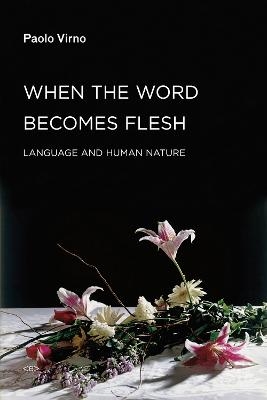
When the Word Becomes Flesh
Language and Human Nature
Seiten
2015
Semiotext (E) (Verlag)
978-1-58435-094-1 (ISBN)
Semiotext (E) (Verlag)
978-1-58435-094-1 (ISBN)
Virno's meditation on speech as an intrinsically political practice mediating between biological invariants and changing historical determinations.
Originally published in Italian in 2002, When the Word Becomes Flesh provides a compelling contribution to the understanding of language and its relation to human nature and social relationships. Adopting Aristotle's definition of the human being as a linguistic and political animal, Paolo Virno frames the act of speech as a foundational philosophical issue-an act that in its purely performative essence ultimately determines our ability to pass from the state of possibility to one of actuality: that is, from the power to act to action itself. As the ultimate public act, speech reveals itself to be an intrinsically political practice mediating between biological invariants and changing historical determinations. In his most complete reflection on the topic to date, Virno shows how language directly expresses the conditions of possibility for our experience, from both a transcendental and a biological point of view.
Drawing on the work of such twentieth-century giants as Ferdinand de Saussure, Ludwig Wittgenstein, Edmund Husserl, and Gottlob Frege, Virno constructs a powerful linguistic meditation on the political challenges faced by the human species in the twenty-first century. It is in language that human nature and our historical potentialities are fully revealed, and it is language that can guide us toward a more aware and purposeful realization of them.
Originally published in Italian in 2002, When the Word Becomes Flesh provides a compelling contribution to the understanding of language and its relation to human nature and social relationships. Adopting Aristotle's definition of the human being as a linguistic and political animal, Paolo Virno frames the act of speech as a foundational philosophical issue-an act that in its purely performative essence ultimately determines our ability to pass from the state of possibility to one of actuality: that is, from the power to act to action itself. As the ultimate public act, speech reveals itself to be an intrinsically political practice mediating between biological invariants and changing historical determinations. In his most complete reflection on the topic to date, Virno shows how language directly expresses the conditions of possibility for our experience, from both a transcendental and a biological point of view.
Drawing on the work of such twentieth-century giants as Ferdinand de Saussure, Ludwig Wittgenstein, Edmund Husserl, and Gottlob Frege, Virno constructs a powerful linguistic meditation on the political challenges faced by the human species in the twenty-first century. It is in language that human nature and our historical potentialities are fully revealed, and it is language that can guide us toward a more aware and purposeful realization of them.
Paolo Virno is an Italian philosopher, semiologist, and a prominent figure among the Italian Postfordist thinkers. He currently teaches at the University of Rome and is the author of A Grammar of the Multitude and Multitude Between Innovation and Negation, both published in English by Semiotext(e).
| Reihe/Serie | Semiotext(e) / Foreign Agents |
|---|---|
| Übersetzer | Giuseppina Mecchia |
| Verlagsort | New York |
| Sprache | englisch |
| Maße | 152 x 229 mm |
| Themenwelt | Geisteswissenschaften ► Philosophie ► Erkenntnistheorie / Wissenschaftstheorie |
| Geisteswissenschaften ► Philosophie ► Sprachphilosophie | |
| ISBN-10 | 1-58435-094-6 / 1584350946 |
| ISBN-13 | 978-1-58435-094-1 / 9781584350941 |
| Zustand | Neuware |
| Haben Sie eine Frage zum Produkt? |
Mehr entdecken
aus dem Bereich
aus dem Bereich
die Grundlegung der modernen Philosophie
Buch | Softcover (2023)
C.H.Beck (Verlag)
CHF 25,20
Buch | Softcover (2023)
Reclam, Philipp (Verlag)
CHF 9,80

![Was heißt Denken?. Vorlesung Wintersemester 1951/52. [Was bedeutet das alles?] - Martin Heidegger](/media/113619842)
